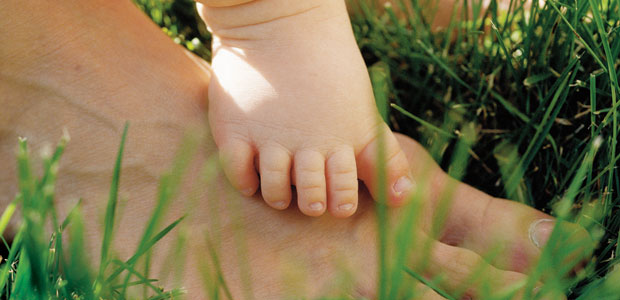Advertisement
Cloth Diapers
Best for our babies, our planets, and us

We adore babies and want the best for them. Time spent with baby is precious, and this may mean making a choice between laundering cloth diapers or enjoying the convenience of disposable diapers. Can we opt for conscientious living and be good to our babies, our planet, and ourselves? Yes, we can.
Organic cloth diapers are now easier to use than ever before–many come sewn prefolded and can be dried in the sun or in a machine dryer. Pocket diapers provide a sewn-in compartment into which an extra pad of fabric can be added for nighttime or for heavy wetting. Adjustable organic cloth diapers with added snaps or fasteners adapt to a growing baby.
Baby Benefits
Informed parents are more concerned with providing a chemical-free, natural environment for their babies. Organic cloth diapers breathe, especially when used overnight in conjunction with a natural wool cover, which is also breathable and moisture resistant. Plastic outer coverings of disposable diapers do not breathe. They hold moisture next to baby’s skin and promote diaper rash.
Chemicals used in the manufacture of disposable diapers and liners can cause allergic reactions on baby’s delicate skin. Conventional disposable paper diapers and even conventional cotton diapers are steeped in chemicals to whiten, brighten, soften, and make them more absorbent.
Cost Control
Parents who balance the cost of initial outlay for organic cloth diapers against the ongoing cost of disposable diapers are pleased to find that the healthier alternative, organic cloth diapers, are cheaper in the long run. Laundering cloth diapers does cost money–laundry soaps, vinegar for rinsing, electricity or gas to heat water and run a dryer. On the other hand, there are costs associated with gasoline for trips to the store to buy new disposables, diaper rash cremes, and extra garbage bags for disposal as well as laundry costs because disposables generally leak, whereas cloth diapers can be more absorbent and tend not to leak.
Cloth diapers with adjustable snaps or Velcro fasteners come in two sizes; other diapers come in four or more sizes. Parents have only to buy half the number of adjustable cloth diapers.
Washing the Wee Cloths
A hemp cloth diaper is more absorbent than cotton. However, hemp requires pre-washing, and the more it is washed, the softer and more absorbent it becomes. A mixture of half hemp and half organic cotton for diapering cloth is ideal–both soft and strong. These diapers will outlast the three years that the average child is in diapers and will be fine to pass on to the next baby in the family or to a relative’s or friend’s baby. One-half cup of white distilled vinegar in the rinse cycle helps soften diapers and remove soap residue.
Waste Not…
Over a span of several generations, this technologically savvy human race is slowly poisoning itself for the sake of convenience. We are filling landfills with tons of disposable diaper waste–both paper and plastic.
What can we do about it? We can make certain the diapers our babies wear are reusable, recyclable, and free of toxins. Organic cloth diapers really are the healthiest choice–economical and ecologically sound.




